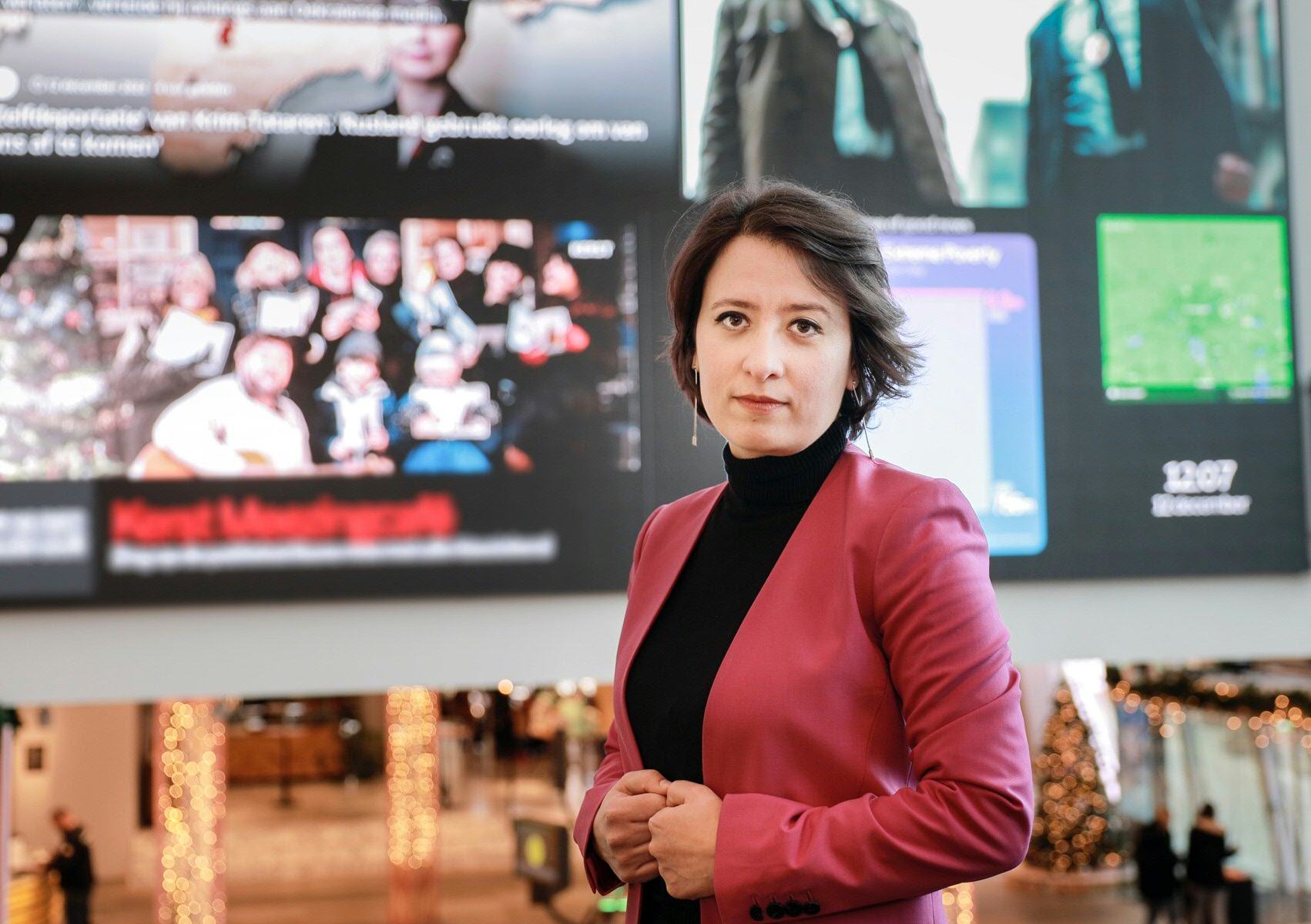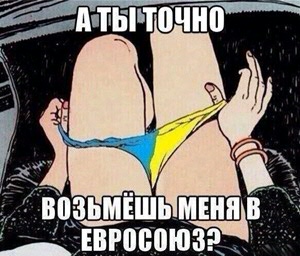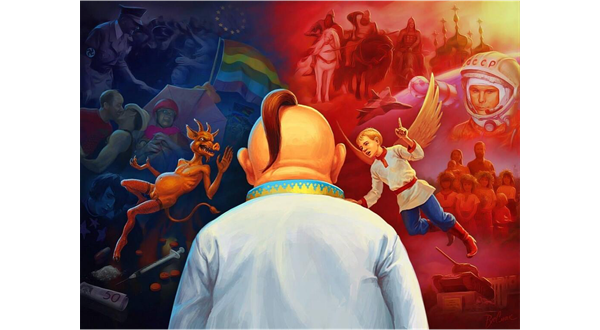How a troll army is disseminating the Kremlin’s war rhetoric
Dr. Lisa Gaufman, Assistant Professor in Russian Discourse and Politics, investigates the rhetoric of the Kremlin on social media. A story about online cartoons and polarizing troll accounts masquerading as concerned citizens.
Text: Marjolein te Winkel / Photo's: Henk Veenstra
Exactly one year ago, on Monday 21 February 2022, in an hours-long speech dripping with war-mongering language, Russian President Putin recognized the separatist People’s Republics of Donetsk and Luhansk as independent states. In response to this speech, Lisa Gaufman wrote a Twitter thread on her research into Russian anti-Ukrainian propaganda on social media, and the significance of the Russian rhetoric. Her conclusion: de-escalation was no longer an option, and war was unavoidable.
Three days later, Russian troops invaded Ukraine. It was one of the worst events in her life, explains Gaufman, who was born and raised in Russia. ‘The weeks before the invasion were awful. I didn’t sleep; I was so worried about my family and friends in Ukraine.’ On Twitter, she expressed her fear and apprehension. This was met with support and understanding, but also disapproval: ‘They said that as an academic, I should not respond to the situation from my emotions. What nonsense. People are dying; I’m allowed to be angry and sad about it.’

Pro-Kremlin war memes
In past years, Gaufman’s research focused among other things on anti-Ukrainian war rhetoric on Vkontakte, a popular Russian social media platform similar to Facebook, with a particular focus on the group calling itself Antimaidan. This name refers to the 2013 Maidan Revolution in Ukraine. At the time, pro-European Ukrainians protested on the Independence Square (Maidan Nezaleshnosti) in Kiev against the Ukrainian government’s decision not to ratify a treaty with the European Union. ‘The Maidan Protests were in favour of a rapprochement with the EU. The Antimaidan group views this rapprochement as a threat and supports the Kremlin’s rhetoric. The group shares propaganda by means of memes — online cartoons shared en masse,’ explains Gaufman.
Gaufman studied thousands of memes from the period from 2014 to 2016, after Russia had invaded and taken over Crimea, and she published a 2022 article on her findings in the scientific journal Media, War & Conflict. She sees the same rhetoric recur in more recent posts on social media. ‘The same old narratives are still being put forward to justify political choices, and the tone of these narratives is misogynistic, homophobic, and fascist.’

Ukraine as a poor, helpless woman
In many memes, Ukraine is portrayed as a woman: either a dissolute woman offering herself to the EU, or a poor, helpless woman who must be protected against the dangerous European influence by big, strong Russia. Another often-shared meme portrays the Ukrainian’s dilemma: if he chooses for Europe, he is choosing for homosexuality, drugs, and Hitler. If he chooses for Russia, then he is choosing for a safe existence under traditional values. Gaufman: ‘The underlying message is: Europe is depraved, godless and perverse, and for traditional Russians, this is a terrifying spectre. With this spectre, Putin hopes to convince the population that traditional values will be destroyed if Ukraine seeks rapprochement with the EU, and that this would have dramatic consequences for the country.’
Internet Research Agency
Behind the creation and dissemination of the memes is a network called the Internet Research Agency. Gaufman: ‘It’s a kind of troll factory in which pro-Kremlin content is generated at a fee.’ The Internet Research Agency is led by Yevgeny Prigozhin, a confidante of Putin who is primarily known as the founder of the Wagner Group, a group of extremely violent Russian mercenaries who were involved in the invasion of Crimea in 2014 and are now fighting at the side of the Russian army in Ukraine.
Together with her colleague Bharath Ganesh, Gaufman also investigates the way in which the Internet Research Agency goes to work on Twitter. ‘For example, during the annexation of Crimea and the start of the war in Eastern Ukraine in 2014, they used #SaveDonbasChildren: save the children of the Donbas, as a justification for the war. They also use the narrative which Putin used to justify his 2022 invasion of Ukraine, namely that Ukrainians are supposedly nazis and that the ‘special military operation’ is needed to ‘de-nazify’ Ukraine. ‘They are trying to create the illusion that what the Kremlin says is true, and that there is strong support for Kremlin politics. To do so, they use stories that are supposed to justify Kremlin politics,’ explains Gaufman.

Trolls on Twitter
In her research, Gaufman sees the same memes as in her research on Vkontakte appear on Twitter, and these memes are again disseminated by various accounts. ‘We also see that the 2014 rhetoric is repeated in Russian-language tweets, for example the need to save children,’ says Gaufman.
She also compares the messages of Russian-language tweets with English-language tweets that are also disseminated by pro-Kremlin troll accounts, and she observes striking differences between the two. ‘English-language tweets have a strategy of their own: contrary to the Russian-language tweets, they do not share any pro-Russian content, but aim to polarize. For example, troll accounts pose as Trump supporters stirring up fear by warning that traditional values are under threat, for example from immigration. These are topics that are also alive among conservative and right-wing people in the US. These accounts succeed in reaching a wide audience. For instance, we ’have tweets from troll accounts being used in news reports of online media to make a point.’
Twitter thread
In her research, Gaufman is frequently confronted with offensive, hateful and sometimes plainly shocking images and posts. This does not prevent her from remaining active on social media herself. ‘Via Twitter, I come into contact with colleagues from other universities. I learn a lot from it, and it gives me access to information that I would not find in the library or by leafing through a catalogue.’ Her Twitter thread from one year ago was shared many times and led to a lot of media interest. ‘My career was given a boost by the war. This feels conflicting. I understand that there is a need for reliable information, but at the same time I would love for my research to be irrelevant, if it meant the end of the war.’

About Lisa Gaufman
Lisa Gaufman (1986) completed a Bachelor’s degree at the Moscow State University for International Relations and a Master’s degree in Peace Studies and International Politics at the University of Tübingen in Germany, where she obtained her doctorate in 2016 with a PhD thesis entitled Enemies at the Gates: Threat Narratives in Putin’s Russia. In 2019, Gaufman was appointed Assistant Professor at the Faculty of Arts of the University of Groningen. After completing her PhD at the University of Tübingen in 2016, she spent three years working as a post-doctoral researcher at the Institute for Intercultural and International Studies of the University of Bremen. She is the author of Security Threats and Public Perception: Digital Russia and the Ukraine Crisis (Palgrave, 2017). This spring, her new book is due to be published, entitled Everyday Foreign Policy: Performing and Consuming the Russian Nation after Crimea.
More information
More news
-
15 September 2025
Successful visit to the UG by Rector of Institut Teknologi Bandung
